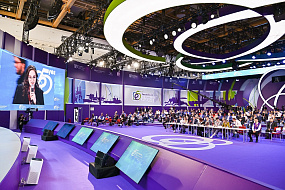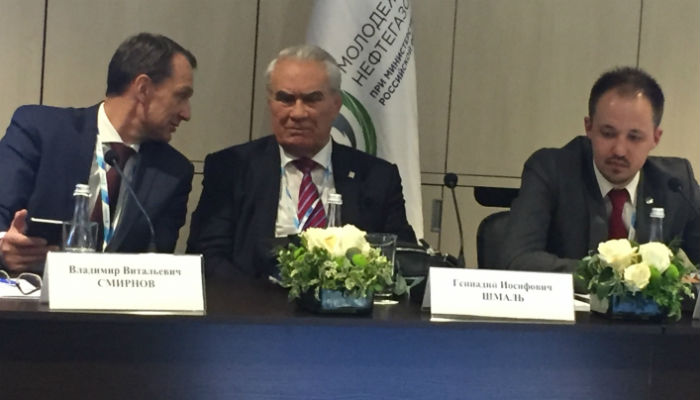The Energy Transition and Its Potential: The Future of Low-Carbon Energy in Russia

KEY CONCLUSIONS
Russia will remain on course for a low-carbon energy transition
“We are forming long-term
plans... and we will fulfil them. They can be adjusted only in some details.
<...> We have fixed at least a doubling of the share of RES [renewable
energy sources, – Ed.] by 2030. <…> We do not forget that RES
include hydroelectric power plants, so we start with the power system we have
now. <...> The share of low-carbon generation in Russia is among the best
in the world... because of nuclear generation, hydro generation. <...>
Banks are one of the main beneficiaries of the RES programme,” Andrey Maximov,
Head of the Department of Electric Power Development, Ministry of Energy of the
Russian Federation.
“The whole world is facing an
unprecedented challenge, and the decisions we make are very important – the
near future depends on it, whether we will be able to cope with a global
temperature rise of one and a half degrees by the end of the century.
<...> Russia has a tremendous potential to implement this energy
transition,” Francesco La Camera, Director General, International Renewable Energy
Agency (IRENA).
“The US and Europe were our
main markets. Now... this agenda is no longer relevant. Let’s look at the
countries we are establishing cooperation with. <...> India is already
creating a carbon certificate market, just like China. <...> Regulation
is a matter of time. Energy production with minimal CO2 will be an important
competitive advantage,” Alexander Vedyakhin, First Deputy Chairman of the
Executive Board, Sberbank.
Over the past few years, there
have been quite serious changes in the regulatory environment. First, it is the
tightening of emission standards... Secondly, it is the Clean Air Project,
which has affected almost all cities with coal-fired generation. This is a
serious challenge for coal-fired generation,” Pavel Barilo, Executive Director,
Siberian Generation Company.
PROBLEMS
An ill-considered transition to green energy has the potential to reduce
sustainability
“As far as development is
concerned, it is really necessary to look from the point of view of neutral
technological selection and to put reliability as a criterion in the first
place and economic efficiency as a criterion in the second place. In many
countries, the mistakes of radical energy transition are becoming more and more
evident,” Pavel Barilo, Executive Director, Siberian
Generation Company.
The existing generation fleet requires upgrade
“Historically and territorially, we have a complex
energy system, because the load centres are in some places, while the centres
where it is more convenient to build RES are in quite different places. This is
a problem that the south is already facing,” Andrey Maximov, Head of the
Department of Electric Power Development, Ministry of Energy of the Russian
Federation.
“The existing generation fleet does not last forever.
<...> We can repair things or cover individual deficits, but we will
still need to make decisions for systemic consumption growth,” Fedor Opadchy,
Chairman of the Board, System Operator of the United Power System.
Industrial growth requires the construction of power facilities in new
consumption centres
“The problem is that energy
consumption is growing, and consumption centres are shifting to the east, to
Siberia and southern regions. <...> The issue of localization of
production and consumption sources is very important. We cannot solve all the
problems with the help of grids – the distances are greater, and it becomes very
expensive. <...> We need controlled generation... nuclear, hydro and
thermal generation,” Fedor Opadchy, Chairman of the Board, System Operator of
the United Power System.
SOLUTIONS
Development of nuclear energy beyond the Urals
“Our main goal after 2035 is to
enter Siberia, the Far East, and the Urals. The grid infrastructure there is
different. Not only high-capacity units will be needed, but also
medium-capacity units. There are isolated areas where low-capacity power
sources are needed,” Alexander Shutikov, General Director, Member, The Board of
Directors, Rosenergoatom Concern.
Reducing the cost of HPP construction by monetizing additional effects
“When developing hydropower
plants, the state should look at integrated development. There are a lot of
additional socio-economic effects that are not assessed in any way... and are
not monetized,” Roman Berdnikov, First Deputy General Director, Member of the
Management Board, RusHydro.
Renewable energy sources can solve the problem of localized power
shortages
“RES facilities are no longer
regarded as generation that nobody needs. <...> For the first time this
year, it was said that RES facilities can be a tool for closing deficits,”
Alexey Zhikharev, Director, Russia Renewable Energy Development Association; Director,
ENSOLVE.
“The energy sector is a part
of Russia’s own economy. <...> When we talk about RES development, we are
talking about the development of competences: mechanical engineering,
electronics. <...> In the second RES support programme, which has already
started, we have made the supply of RES equipment for export a mandatory
condition for receiving payment. <...> The first stage of RES development
was about localization of production, while now it is about exports,” Andrey
Maximov, Head of the Department of Electric Power Development, Ministry of
Energy of the Russian Federation.
For more information, visit
the Roscongress Foundation’s Information and Analytical System at roscongress.org/en.
The Russian Energy Week International Forum is a key global platform for discussing current trends in the development of the modern fuel and energy sector. This event is traditionally held at the highest level, featuring the participation of leaders from the largest companies in the energy industry. In 2022, more than 70 events, with the involvement of over 270 speakers, were held as part of REW. The Forum attracted over 3,000 participants and media representatives from Russia, as well as 83 foreign countries and territories. The Forum is organized by the Roscongress Foundation and the Ministry of Energy of the Russian Federation, with the support of the Moscow City Government.
Official website of REW: rusenergyweek.com. For news about the event and the industry, please follow the official REW page on VK.





